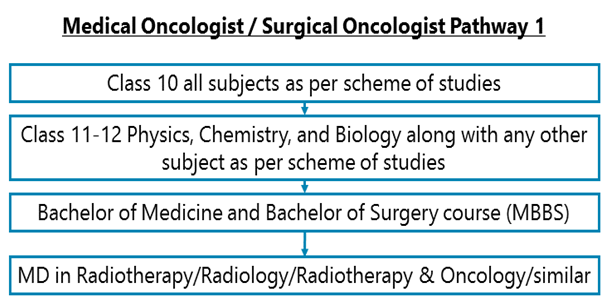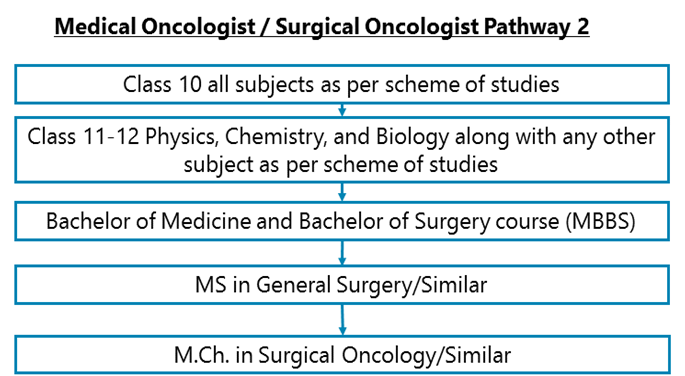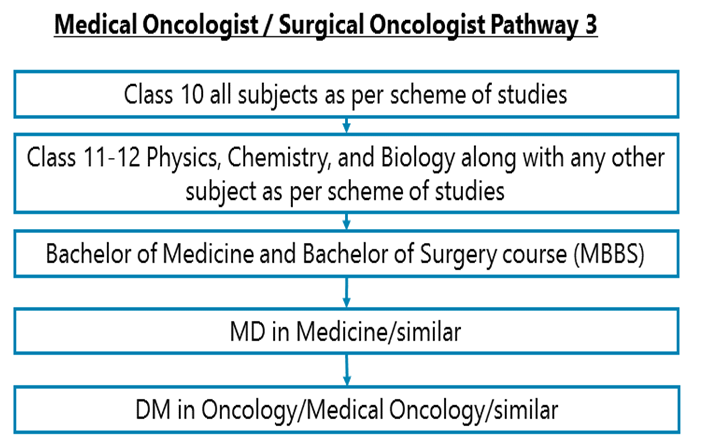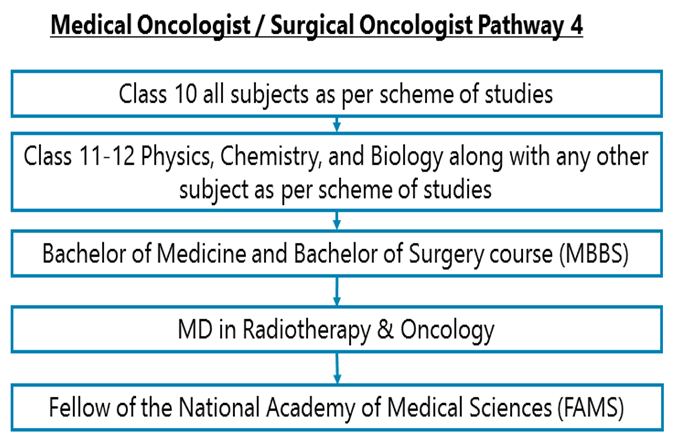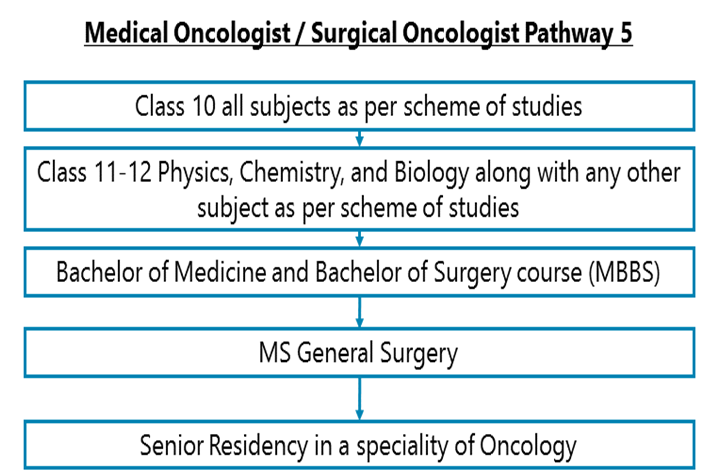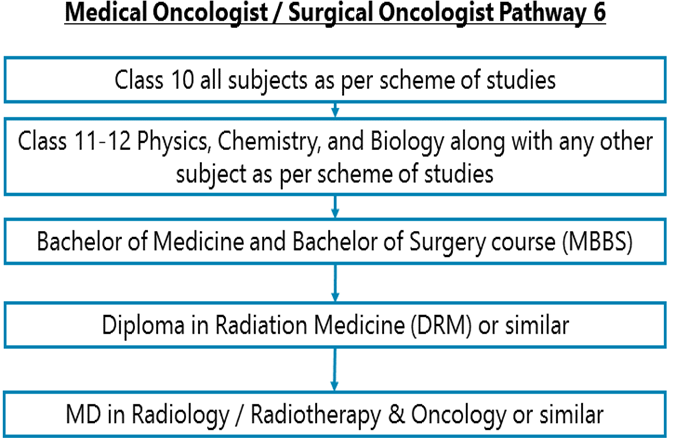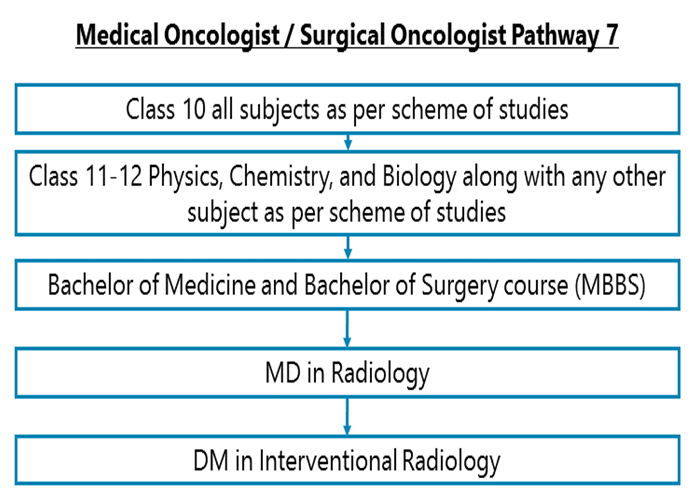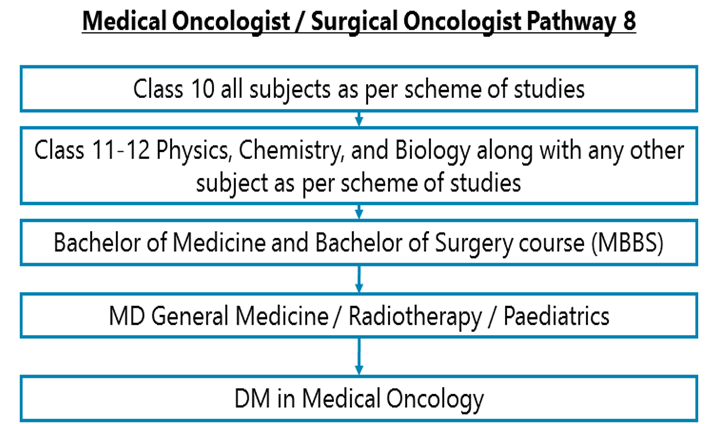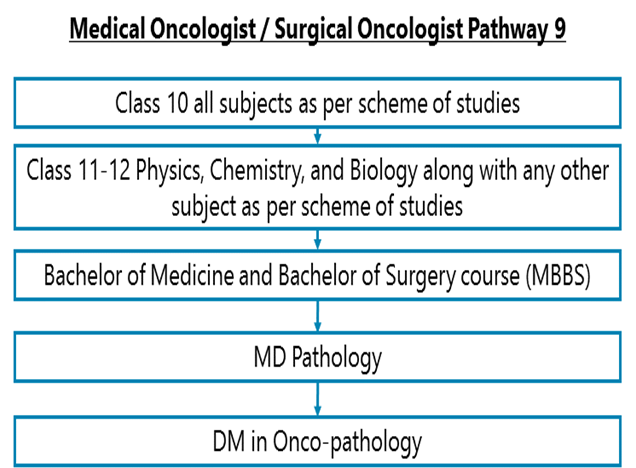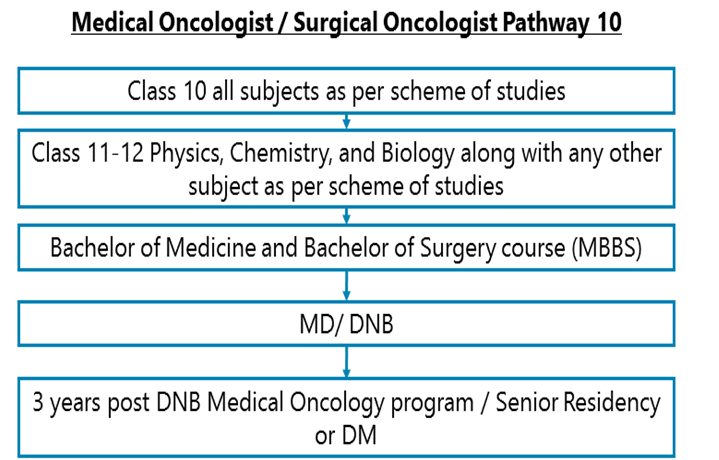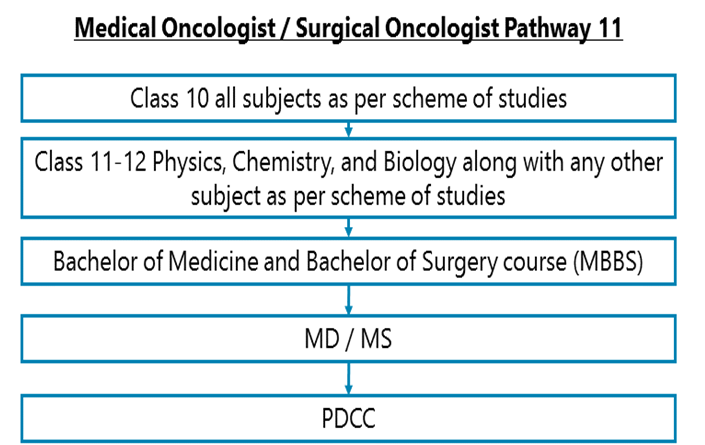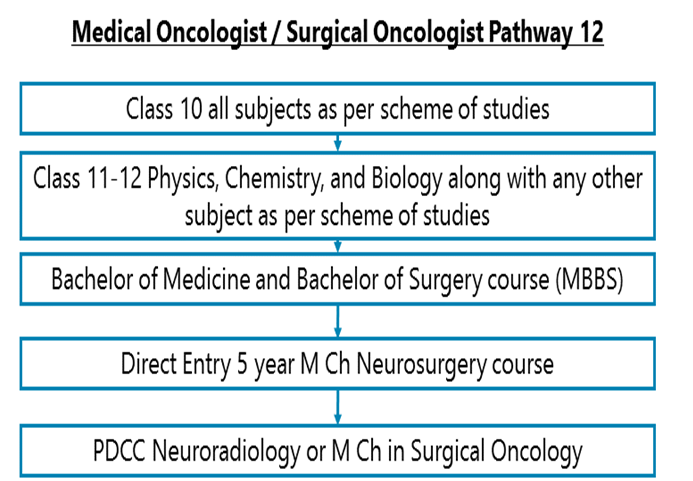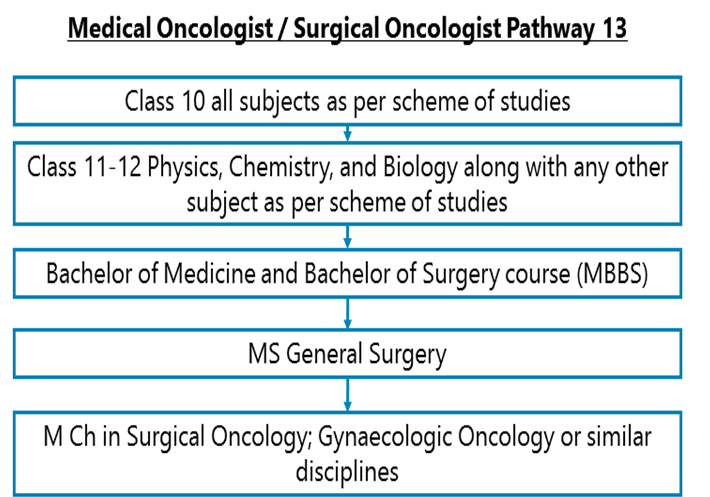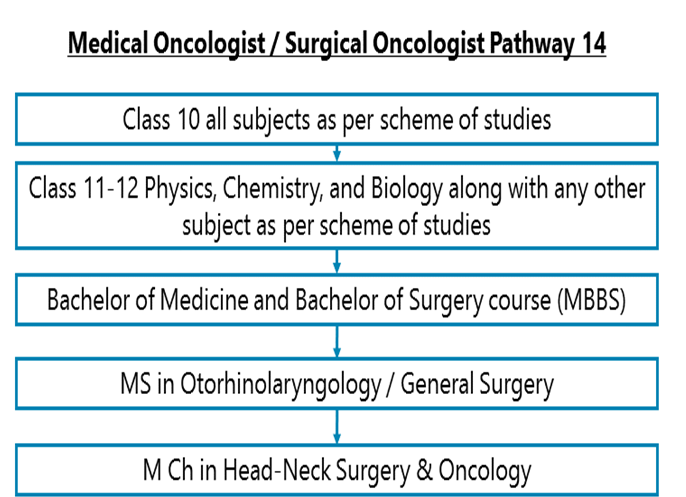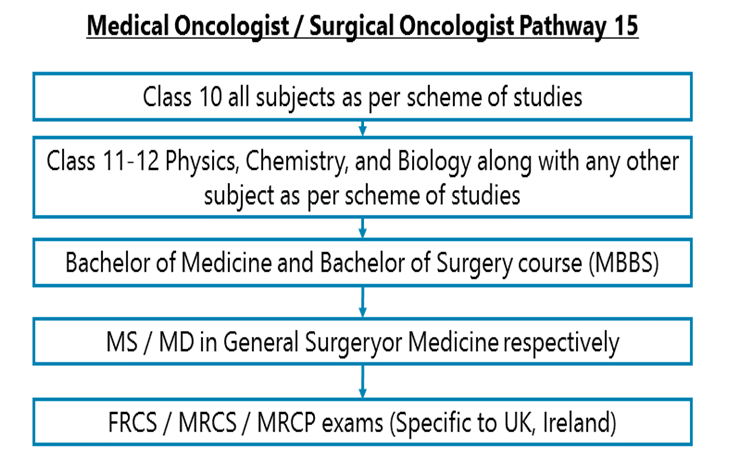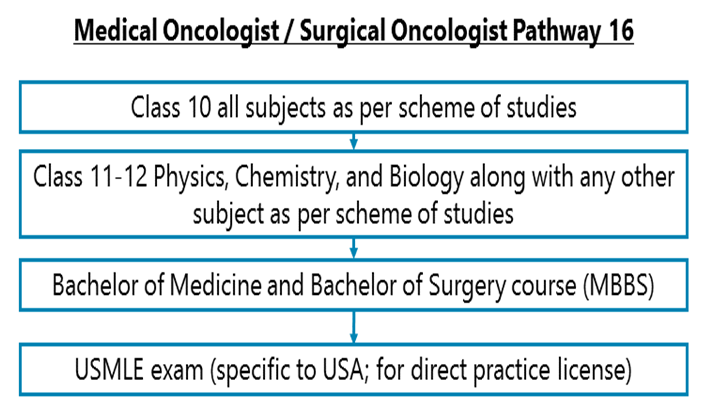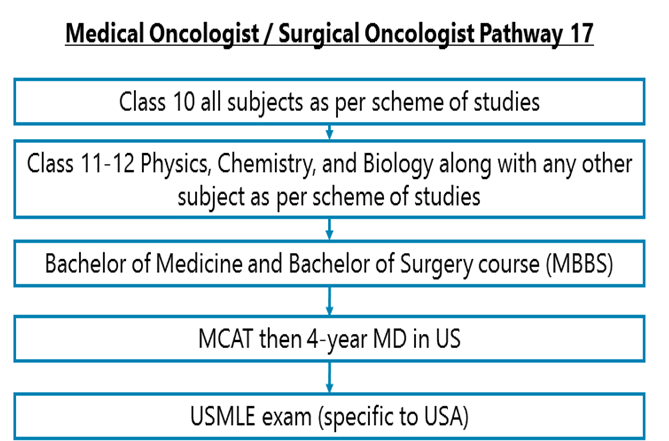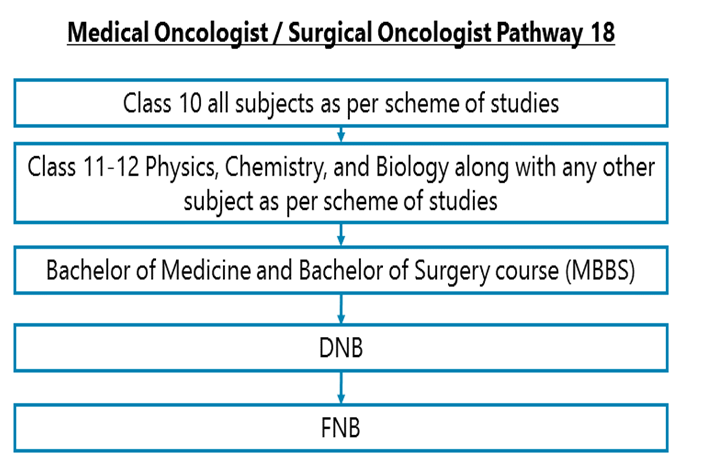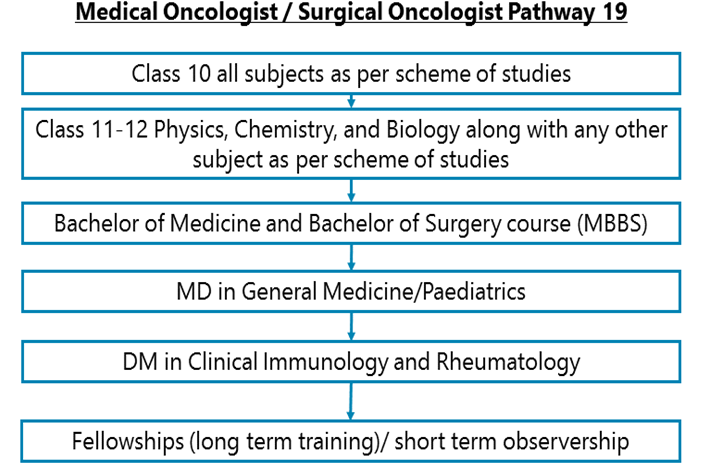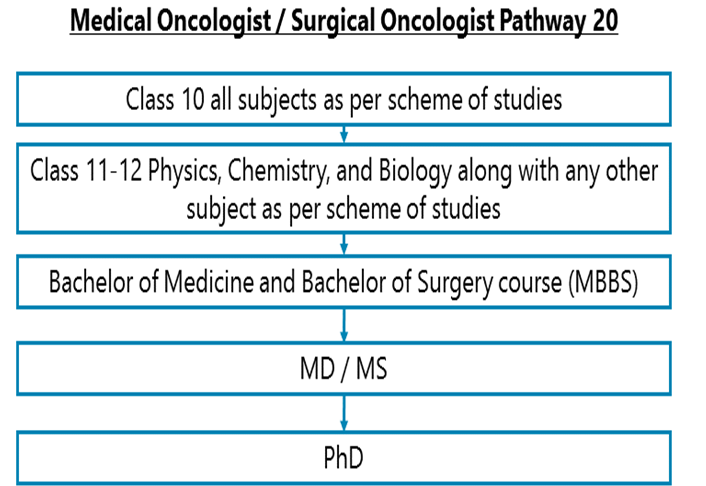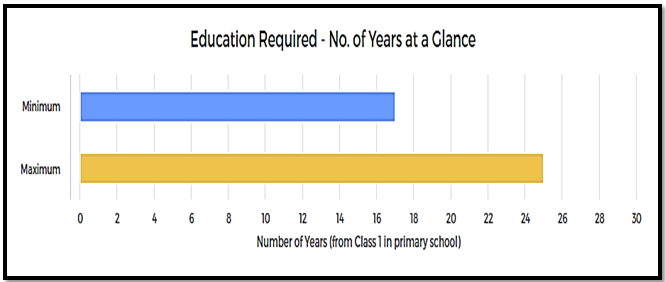Medical Oncologist / Surgical Oncologist
Entry Level Qualification
12
Career Fields
Medical Services
For Specially Abled




About Career
PARTICULARS | DESCRIPTION |
Name | Medical Oncologist / Surgical Oncologist |
Purpose | Diagnose and Treat Cancer |
Career Field | Allied & Para Medical Science |
Required Entrance Exam | NEET UG, NEET PG, AIIMS PG INICET |
Average Salary | 12,00,000 - 20,00,000 Rs. Per Year |
Companies For You | Tata Memorial Hospital, National Cancer Institute & Many More |
Who is Eligible | Graduate |
As an Oncologist, you will specialize in the prevention, diagnosis, and treatment of different types of cancers. The 3 main types of professional Oncologists are Medical, Surgical and Radiation Oncologists.
A brief on cancer
1. Cancer is the uncontrolled growth of abnormal cells in the body. When one has cancer, old cells do not die and instead grow out of control, forming new, abnormal cells. These extra cells may form a mass of tissue, called a tumor. Tumors can be either benign or malignant or develop into a malignant one after being benign for a while. When one’s body has any malignant tumor, one is said to be suffering from cancer.
2. Benign meaning the proliferating cells are incapable to spreading to unaffected parts of our body & invading healthy cells and malignant means the chances of spreading (metastasis) are very high or may have already started spreading to other parts of our body.
3. Tumors can be solid or liquid. Lymphomas and leukemias are examples of "liquid tumors" or cancers present in body fluids (the blood and bone marrow)and are detectable by blood laboratory tests. Solid tumors are abnormal masses of tissue that usually does not contain cysts or liquid areas. Solid tumors may be benign (not cancer), or malignant (cancer). Different types of solid tumors are named for the type of cells that form them. Examples of solid tumors are sarcomas, carcinomas. Sarcomas lead to cancer of the connective tissues – such as bones, muscles, nerves, etc. Carcinoma begins in the cells of the skins or tissues lining organs such as the kidney, uterus, etc.
Medical, Surgical, and Radiation – various types of treatments of cancers
1. Medical Oncologists treat cancerous growths or tumors with chemotherapy, targeted therapy, immunotherapy and hormonal therapy. Nowadays, the term neoplasm is being used interchangeably with tumor. Chemotherapy is probably the most popular term. It is a type of cancer treatment that uses one or more anti-cancer drugs.
2. Targeted therapy (similar to chemo as it also used drugs) works by targeting the cancer's specific genes, proteins, or the tissue environment that contributes to cancer growth and survival.
3. Immunotherapy is a type of cancer treatment that boosts the body's natural defenses to fight cancer by stopping/slowing the cancer growth or by helping the immune system to work better using monoclonal antibodies, virus therapy, t-cell methods or vaccines, etc.
4. Hormone therapy is a cancer treatment that slows or stops the growth of those cancers which specifically use hormones to grow. This is done in 2 distinct ways either by blocking the production of hormones or by manipulating how a hormone works inside a human body.
5. Surgical Oncologists treat cancerous growths or tumors through surgery (manual or robotic). The most common types of technologies used for the treatment of cancers are laser surgery, cryosurgery, electrosurgery, radiofrequency ablation, Mohs surgery, thoracoscopic surgery etc.
6. Radiation Oncologists use ionizing radiation normally delivered by a linear accelerator(LINAC – instrument to produce high energy x-rays or electrons in a tumor's shape& destroy cancer cells while sparing the healthy ones) to treat control or kill malignant cells. This type of treatment may be curative if the cancer is localized to one area of the body. It may also be used to prevent tumor recurrence after a primary malignant tumor is surgically removed. It has also been used before, during, and after chemotherapy. Ionizing radiation works by damaging the DNA of cancerous tissue leading to cellular death.
Functional Fields of Work
Clinical / Diagnostic / Operative Care:
Work involves diagnoses, management of the prognoses (how a disease progresses & assessing that progress) and treatment/therapy provided to patients suffering from malignant or benign neoplasms/tumors involving any part of the human body. Treatment could be done by surgery or through the administration of medications(chemotherapy, targeted therapy, immunotherapy, or hormonal therapy) or through radiation.
Medical Research
1. You can pursue a career as a physician-scientist. Work will be completely laboratory-based sometimes involving field collections of samples (human/animal). Depending on your interest, there are several different disciplines to choose from, including laboratory science, clinical research, and health services research.
2. Researchers often work at academic medical centers, for the pharmaceutical industry, or with the government. If you’re considering a career in research, it will be important to maximize your research experiences during medical school.
3. You can do this by participating in a research project, taking a gap year for a research scholars’ program or other structured research experience, or participating in summer research internships.
4. For an example, you may be board certified in Medical Oncology (for a practice license) and an Associate Professor of Medicine as well, simultaneously you may also be a recipient of research grants from different sources and pursue scientific research on chemotherapy toxicity, impact of cryosurgery on gliomas. specifically, if you are researching on the development of novel screening and therapeutic strategies or new therapies.
5. Research may also revolve around novel drug delivery mechanisms or for testing new drugs by focusing on local radio immunotherapy, nan channels for solid tumors, platinum complexes for soft tissue tumors or measurements of body composition, etc. required to determine the stability of a newly discovered drug (translational research before high volume commercial production).
Education and Training:
Typically, in medical colleges and universities, all educators are involved in training and educating aspiring doctors. This includes operative techniques & experiences as well as theoretical lectures to develop a deep understanding of clinical and basic sciences surrounding Oncology and its various sub-specialties including the principles of tumor investigation, interpretation of diagnostic test results and employed technologies.
Key Roles and Responsibilities
As an Oncologist, depending on your functional field of work, you will be engaged with one or more of the following roles and responsibilities: -
Clinical / Diagnostic / Operative Care:
1. You will be examining a patient (physical examination and primary screening) for diagnosis of and obtaining information on medical/physical conditions, history, and tendencies to ascertain necessary medical attention or required surgical procedures.
2. You will be diagnosing bodily disorders and clinical conditions and suggest therapeutic treatments, such as prescribing medicines or necessary surgeries, in hospital wards, clinics, or operating rooms.
3. You will be determining the nature of treatment, conferring with other medical professionals if required for or to obtain historical data to construct a patient’s medical portfolio and plan further treatment - advising throughout the prognosis (progression) of a disease.
4. You will be involved in recording patient’s condition or progress throughout the tenure of your treatment sessions, writing reports and maintaining proper registers containing patient information(case histories).
5. You will be managing surgery services, including performing surgeries, planning, arranging, scheduling and coordinating processes, or procuring of equipment and supplies.
Medical Research:
1. You will plan, organize, coordinate& participate in scientific research projects, in collaborative work on study/experiment design, data analysis, & manuscript preparation for various scientific projects.
2. You will bring new agents for cancer treatment more quickly from the laboratory to clinical trials (testing of laboratory product on human patients diagnosed with multiple tumor types).
3. You will identify & implement strategies to enhance collaboration between investigators and clinical or research scientists.
4. You will determine specific goals or objectives to be obtained; evaluate research data and develop& revise techniques or approaches to work problems.
5. You will function in a separate & independent manner in the design and initiation of research experiments.
6. You will design, develop or adapt equipment used in experiments or research to obtain desired results. You will be responsible for laboratory equipment and implementing safety procedures.
7. You will independently compose abstracts, technical reports, slide presentations, posters, spreadsheets, and manuscripts for submission to corporate and federal sponsors, conferences, and scientific journals.
8. You will produce medical illustrations, scientific posters, publication graphics, and slide presentations for national & international meetings.
Education and Training:
1. You will be involved in instructing/teaching to a class of students pursuing postgraduate or higher levels of study in the fields of Medical / Surgical Oncology or related disciplines.
2. You will demonstrate techniques or handling of instruments/tools to your students inside an operation theatre and counsel/guidance in the performance of operative experiments.
3. You will participate in seminars, medical congresses, conferences across the world.
Career Entry Pathway
Class 10 all subjects as per scheme of studies – Class 11-12 Physics, Chemistry, and Biology along with any other subject as per scheme of studies – MBBS - MD in Radiotherapy/Radiology/Radiotherapy & Oncology/similar
After completing Class 11-12 Physics, Chemistry, and Biology along with any other subject as per scheme of studies, you need to finish your graduation with a MBBS degree. Then go for MD in Radiotherapy/ Radiology/ Radiotherapy & Oncology/ similar.
Class 10 all subjects as per scheme of studies – Class 11-12 Physics, Chemistry, and Biology along with any other subject as per scheme of studies – MBBS - MS in General Surgery/Similar – M.Ch. in Surgical Oncology/Similar
After completing Class 11-12 Physics, Chemistry, and Biology along with any other subject as per scheme of studies, you need to finish your graduation with a MBBS degree. Then go for MS in General Surgery/Similar followed by M.Ch. in Surgical Oncology/Similar.
Class 10 all subjects as per scheme of studies – Class 11-12 Physics, Chemistry, and Biology along with any other subject as per scheme of studies – MBBS - MD in Medicine/similar – DM in Oncology/Medical Oncology/similar
After completing Class 11-12 Physics, Chemistry, and Biology along with any other subject as per scheme of studies, you need to finish your graduation with a MBBS degree. Then go for MD in Medicine/similar – DM in Oncology/Medical Oncology/similar
Class 10 all subjects as per scheme of studies – Class 11-12 Physics, Chemistry, and Biology along with any other subject as per scheme of studies - MBBS - MD - FAMS
After completing Class 11-12 Physics, Chemistry, and Biology along with any other subject as per scheme of studies, you need to complete MBBS followed by MD in Radiotherapy & Oncology. Then you can obtain Fellowship of National Academy of Medical Sciences (FAMS).
Class 10 all subjects as per scheme of studies – Class 11-12 Physics, Chemistry, and Biology along with any other subject as per scheme of studies – MBBS – MS General Surgery – Senior Residency in a speciality of Oncology
After completing Class 11-12 Physics, Chemistry, and Biology along with any other subject as per scheme of studies, you need to finish your graduation with a MBBS degree. Then you must go for MS in General Surgery. Thereafter, go for Senior Residency in Surgical Oncology, Colorectal Surgery, Head & Neck Oncology, Breast Oncology, Gastrointestinal Oncology (Gastro Esophageal, Hepato –Biliary, Colorectal cancers), Thoracic Oncology, Genito-Urinary & Gynae Oncology, Bone & Soft Tissue Tumors or similar disciplines. In India, Senior Residency program leads to an MCh degree or an FNB (Fellow of National Board) qualification.
Class 10 all subjects as per scheme of studies – Class 11-12 Physics, Chemistry, and Biology along with any other subject as per scheme of studies - MBBS - Diploma - MD
After completing Class 11-12 Physics, Chemistry, and Biology along with any other subject as per scheme of studies, you need to finish your graduation with a MBBS degree. Thereafter you go for a Diploma in Radiation Medicine (DRM) or Medical Radio-Diagnosis or Immuno-Haematology& Blood Transfusion or Medical Radiology and Electrology or similar after which you can do MD in Radiology / Radiotherapy / or similar. Then apply for fellowships / residencies.
Class 10 all subjects as per scheme of studies – Class 11-12 Physics, Chemistry, and Biology along with any other subject as per scheme of studies – MBBS – MD in Radiology – DM in Interventional Radiology
After completing Class 11-12 Physics, Chemistry, and Biology along with any other subject as per scheme of studies, you need to finish your graduation with a MBBS degree. Then go for MD in Radiology followed by DM in Interventional Radiology.
Class 10 all subjects as per scheme of studies – Class 11-12 Physics, Chemistry, and Biology along with any other subject as per scheme of studies – MBBS - MD General Medicine / Radiotherapy / Paediatrics – DM in Medical Oncology
After completing Class 11-12 Physics, Chemistry, and Biology along with any other subject as per scheme of studies, you need to finish your graduation with a MBBS degree. Then go for MD in General Medicine / Radiotherapy / Paediatrics followed by DM in Medical Oncology / Paediatric Oncology etc.
Class 10 all subjects as per scheme of studies – Class 11-12 Physics, Chemistry, and Biology along with any other subject as per scheme of studies – MBBS - MD Pathology – DM in Onco-pathology
After completing Class 11-12 Physics, Chemistry, and Biology along with any other subject as per scheme of studies, you need to finish your graduation with a MBBS degree. Then go for MD in Pathology followed by DM in Onco-pathology.
Class 10 all subjects as per scheme of studies – Class 11-12 Physics, Chemistry, and Biology along with any other subject as per scheme of studies – MBBS – MD/ DNB –3 years post DNB MedicalOncology program / Senior Residencyor DM
After completing Class 11-12 Physics, Chemistry, and Biology along with any other subject as per scheme of studies, you need to finish your graduation with a MBBS degree. Thereafter, you can complete MD / MS in General Medicine/ Radiology/General Surgery or any other discipline and then directly go for PDCC courses (Post-doctoral Certificate Courses) in Cardiovascular Imaging and Vascular Interventional Radiology, Oncopathology, Diagnostic Neuroradiology, Gastro-Radiology, Haemato-Oncology, Interventional Radiology or similar. The maximum duration of PDCC courses as permitted by the Medical Council of India (MCI) is 3 years.
Class 10 all subjects as per scheme of studies – Class 11-12 Physics, Chemistry, and Biology along with any other subject as per scheme of studies – MBBS – MD / MS – PDCC
After completing Class 11-12 Physics, Chemistry, and Biology along with any other subject as per scheme of studies, you need to finish your graduation with a MBBS degree. Thereafter, you can complete MD / MS in General Medicine/ Radiology/General Surgery or any other discipline and then directly go for PDCC courses (Post-doctoral Certificate Courses) in Cardiovascular Imaging and Vascular Interventional Radiology, Oncopathology, Diagnostic Neuroradiology, Gastro-Radiology, Haemato-Oncology, Interventional Radiology or similar. The maximum duration of PDCC courses as permitted by the Medical Council of India (MCI) is 3 years.
Class 10 all subjects as per scheme of studies – Class 11-12 Physics, Chemistry, and Biology along with any other subject as per scheme of studies – MBBS – Direct Entry 5 year M Ch Neurosurgery course – PDCC Neuroradiology or M Ch in Surgical Oncology
After completing Class 11-12 Physics, Chemistry, and Biology along with any other subject as per scheme of studies, you need to finish your graduation with a MBBS degree. Thereafter, you can directly go for a 5 year M Ch course only available in select disciplines such as Neuro-surgery. Follow it up with a PDCC course in Neuroradiology or in other disciplines. Alternatively, you can go for another regular M Ch program for Surgical Oncology.
Class 10 all subjects as per scheme of studies – Class 11-12 Physics, Chemistry, and Biology along with any other subject as per scheme of studies – MBBS – MS General Surgery – M Ch
After completing Class 11-12 Physics, Chemistry, and Biology along with any other subject as per scheme of studies, you need to finish your graduation with a MBBS degree. Then you must go for MS in General Surgery.Thereafter, go for M Ch in Surgical Oncology; Gynaecologic Oncology or similar disciplines.
Class 10 all subjects as per scheme of studies – Class 11-12 Physics, Chemistry, and Biology along with any other subject as per scheme of studies – MBBS – MS in Otorhinolaryngology / General Surgery – M Ch in Head-Neck Surgery & Oncology
After completing Class 11-12 Physics, Chemistry, and Biology along with any other subject as per scheme of studies, you need to finish your graduation with a MBBS degree. Then you must go for MS in Otorhinolaryngology / General Surgery. Thereafter, go for M Ch in Head-Neck Surgery & Oncology after MS. M Ch degrees can only be done after MS.
Class 10 all subjects as per scheme of studies – Class 11-12 Physics, Chemistry, and Biology along with any other subject as per scheme of studies– MBBS - MS / MD in General Surgeryor Medicine respectively – FRCS / MRCS / MRCP exams (Specific to UK, Ireland)
After completing Class 11-12 Physics, Chemistry, and Biology along with any other subject as per scheme of studies, you need to finish your graduation with a MBBS degree. Then you mustacquire MD / MS degree in any discipline. MD is oriented towards Internal Medicine but if you want to be an “Oncology Surgeon”, you will have to go for an MS instead of MD after MBBS. After MD / MS go for MRCP / MRCS / FRCS certifications. These exams are conducted in India at various locations.
Class 10 all subjects as per scheme of studies – Class 11-12 Physics, Chemistry, and Biology along with any other subject as per scheme of studies – MBBS – USMLE exam (specific to USA; for direct practice license)
After completing Class 11-12 Physics, Chemistry, and Biology along with any other subject as per scheme of studies, you need to finish your graduation with a MBBS degree. While you are completing your MBBS degree, you will have to decide whether you want to obtain further education in the US or practice directly there. If you want to practice directly, you will have to start preparing for USMLE exam (United States Medical Licensing Examination) from your 3rd year itself, if not earlier. There are 3 parts to it – Step 1, Step 2 CK (Clinical Knowledge) and Step 3 CS (Clinical Skills).
Class 10 all subjects as per scheme of studies – Class 11-12 Physics, Chemistry, and Biology along with any other subject as per scheme of studies – MBBS– MCAT – 4-year MD in US - USMLE exam (specific to USA)
After completing Class 11-12 Physics, Chemistry, and Biology along with any other subject as per scheme of studies, you need to finish your graduation with a MBBS degree then appear for MCAT. While you are completing your graduation degree, you will have to decide whether you want to obtain further education in the US or practice directly there. If you want to study further and then practice medicine or surgery in the US, you will have to first appear for the MCAT exam and finish the 4 year MD course there (equivalent to MBBS in India). In US, all courses after MD involves Residency and generally one does not get any more degree but obtain Fellowships after residencies. After your MD from an American medical college, you will have to appear for USMLE to obtain licensure for practicing as a medical professional in the US and start with a residency there.
Class 10 all subjects as per scheme of studies – Class 11-12 Physics, Chemistry, and Biology along with any other subject as per scheme of studies - MBBS - DNB - FNB
After completing Class 11-12 Physics, Chemistry, and Biology along with any other subject as per scheme of studies, you need to finish your graduation with a MBBS degree. Then you can go for DNB (Diplomate of National Board) Final Examination after completing 5-year DNB training successfully. You will only get 2 attempts for the practical examination if you pass the theory exam. Then you can pursue the post-doctoral fellowship program to be a Fellow of National Board (FNB) in any of the super specialties like Neuro-oncology, Ocular oncology, Head & Neck oncology, Thoracic oncology, Breast oncology, Gastrointestinal oncology, Bone & Musculoskeletal oncology, Dermatological oncology, Genitourinary oncology, Gynecologic oncology, Pediatric oncology, Hematology etc.
Class 10 all subjects as per scheme of studies – Class 11-12 Physics, Chemistry, and Biology along with any other subject as per scheme of studies – MBBS – MD in General Medicine/Paediatrics– DM in Clinical Immunology and Rheumatology – Fellowships (long term training)/ short term observership
After completing Class 11-12 Physics, Chemistry, and Biology along with any other subject as per scheme of studies, you need to finish your graduation with a MBBS degree. Then go for MD in General Medicine/Paediatricsfollowed by DM in Clinical Immunology and Rheumatology. Then go for Fellowships (long term training) or short term observerships to specialize in hematology / immuno oncology / paediatric oncology etc.
Class 10 all subjects as per scheme of studies – Class 11-12 Physics, Chemistry, and Biology along with any other subject as per scheme of studies– MBBS - MD / MS - PhD
After completing Class 11-12 Physics, Chemistry, and Biology along with any other subject as per scheme of studies, you need to finish your graduation with a MBBS degree. Then you can go for MD / MS degree followed by your PhD studies inany of the super specialties like Neuro-surgery, Medical Oncology, Hematology, Nuclear Medicine, Paediatric Surgery, Radiotherapy, general surgery, radio diagnosis, urology, pathology or similar disciplines. The period of training for Ph.D. shall be 2 years after post-graduation in medical disciplines.
Class 10 all subjects as per scheme of studies – Class 11-12 Physics, Chemistry, and Biology along with any other subject as per scheme of studies – MBBS - MD/MS (Obstetrics& Gynaecology)– MCh in Gynecological Oncology
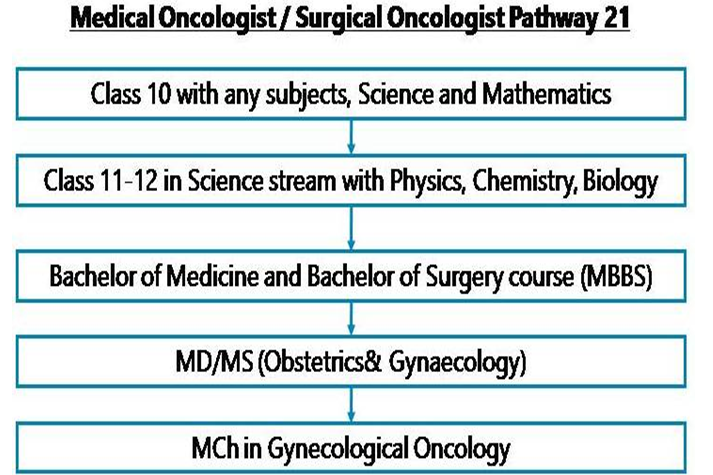
After completing Class 11-12 Physics, Chemistry, and Biology along with any other subject as per scheme of studies, you need to finish your graduation with a MBBS degree. Then go for MD/MS (Obstetrics& Gynaecology) followed by M Ch in Gynecological Oncology. This option is open to both MD and MS pass-outs.
Required Qualification & Competencies
1. After Class 11-12, you must go for your Bachelor of Medicine and Bachelor of Surgery course (MBBS). Various forms of this qualification’s name are MB ChB, MB BChir, BM BCh, BMBS and MB BCh around the globe.
2. After your graduation, you must go for a Master / post-graduation PG level program like MD, DNB, MS and complete junior residencies to specialize in various branches of Medicine or Surgery.
3. DNB is considered equivalent to MD / MS. The only difference is for MD and MS you will be trained in medical colleges with hundreds of patients and for DNB you will be trained in private hospitals (with at least 500 beds).
4. After post-graduation, you can further proceed with FNB, M Ch, DM or PDCC if you want to higher qualifications or obtain a PhD if you want to be a physician scientist.
You can obtain various fellowships & memberships such as:
1. Indian Society of Oncology
2. Fellow of the Royal College of Radiologists (FRCR)
3. Association of Radiation Oncology of India (AROI)
4. European Society for Radiotherapy and Oncology (ESTRO)
5. Indian Medical Association
6. American Society for Therapeutic Oncology (ASTRO)
7. Indian Co-operative Oncology Network
In the UK, MRCP / MRCS / FRCS is mandatory to practice as an Oncologist.
1. You have to qualify graduation from any medical school (in UK or any other country including India), complete MD/MS (if you are studying in India) and obtain your MRCP / MRCS qualification from any of the Royal Colleges (Edinburgh, Glasgow, London – for medicine / radiation; England, Edinburgh, Glasgow, Ireland – for surgery).
2. For Medicine, there are 3 Royal Colleges that grant membership certifications: in Edinburgh, Glasgow and London.
3. MRCS (for membership) and FRCS (for fellowship) are for practicing surgeons.
4. For Surgery, membership certificates are granted by any of the 4 Royal Colleges: Royal College of Surgeons of England, the Royal College of Surgeons of Edinburgh, the Royal College of Physicians and Surgeons of Glasgow and the Royal College of Surgeons in Ireland.
5. MRCS and MRCP are conducted by each college separately. FRCS (only for surgical specialties) is an examination which is jointly conducted by a mutual committee formed by all 4 Royal Colleges of Surgery (called Joint Committee on Intercollegiate Examinations).
6. So, there are 3 different MRCP exams by 3 different colleges, 4 different MRCS exams by the 4 different colleges and 1 FRCS exam jointly conducted which is the International Fellowship Examination (JSCFE).Each exam has its own format that can be referred to from respective portals of conducting bodies.
7. Also, if you (an aspiring surgeon) pass MRCS of 1 college or FRCS (the joint exam for Fellowship), you are eligible to be transferred as a member of any RCS by submitting the relevant transfer form.
8. You can appear for any MRCP or MRCS exams from India. You can also appear for the International Fellowship Examination (JSCFE) exam from India. Exam centers in India include many cities such as New Delhi, Hyderabad, Chennai etc. The fee for New Delhi is the lowest usually.
9. For JSCFE, you will have a maximum of 7 years to complete the 2 sections of this exam, Section 1 & Section 2. You will have 2 years from your 1st attempt with a maximum of 4 attempts for Section 1 and a maximum of 4 attempts with no re-entry for Section 2. Section 1 is further divided into Paper 1 and Paper 2. Section 2 is the clinical component of JSCFE consisting of a series of carefully designed & structured interviews on clinical topics.
10. If you are targeting US or Canada, remember, you will have to clear USMLE after you complete an MBBS program in India to be able to directly practice in the US. To study in medical schools in USA or Canada for an MD degree before practicing there, you will have to clear the MCAT. The Medical College Admission Test (MCAT) is a compulsory test for anyone who plans to get admission in medical schools of USA and Canada. MD degrees are followed by 3 to 7 years of residency. Graduates can practise any specialty. Physicians are fully certified after passing board exams.152 MD-granting schools in the United States and 17 in Canada.
11. MCAT consists for 4 distinct sections which are individually scored. Each section is allotted either 90 or 95 minutes and tests between 50 and 60 questions. Including breaks, the full examination lasts approximately 7.5 hours.
12. Most MBBS graduates go for further study by passing MCAT, completing 4- year MD in US or Canada and then appearing for USMLE because this way is easier. However, some MBBS graduates avoid this path and directly aim at USMLE from India but cannot succeed as they lack US-based education which is extremely essential in order to pass USMLE.
13. MCAT is administered 25 times in a year. With a pass in MCAT, they will need to complete a medical degree (MD) in the US or Canada which is for 4 years. Then they can appear for USMLE and get a practice license.
14. Remember: after passing USMLE once, you cannot repeat it for attempting a better score. Programs usually eliminate candidates with multiple attempts. For this reason, it is essential to do extremely well in the first attempt. Further, your answers will not be evaluated on a population curve basis; you will be marked on the level of difficulty of the items you have attempted during the examination.
15. Indian graduates from any other discipline (other than MBBS) are also eligible to practice as a Medical Professional in the US but they have to appear for MCAT with a ‘special permission from Association of American Medical Colleges (AAMC) (before registering for the exam, mail to mcat@aamc.org stating the reasons why you wish to take the exam). If you are specially permitted by AAMC, which is rare, you can then attempt & clear MCAT, then pass 4-year MD, then clear USMLE and then practice in US / Canada.
So, in short
MBBS in India > MCAT > Basic Medical Degree in US / Canada (MD) > USMLE >Practice
Alternatively, a tougher router is,
MBBS in India > USMLE >Practice
For non-medical graduates from India,
Bachelor's degree (duration is not a factor) > MCAT with special permission>Basic Medical Degree in US / Canada (MD) > USMLE >Practice
MINIMUM EDUCATION REQUIRED | MAXIMUM EDUCATION REQUIRED |
Under Graduate Undergraduate Degree / Honours Diploma / Graduate Diploma (equivalent to a Degree) Programs for which the minimum eligibility is a pass in Higher Secondary / Class XII School Leaving examination. | Post-Doctoral Post Ph.D. programs for which the minimum eligibility is a Doctoral degree. |
Competencies Required
Interest
1. You should have interests for Investigative Occupations. Investigative occupations involve working with ideas and quite a lot of thinking, often abstract or conceptual thinking. These involve learning about facts and figures; involve use of data analysis, assessment of situations, decision making and problem solving.
2. You should have interests for Realistic Occupations. Realistic occupations involve more practical and hands-on activities than paperwork or office work. Realistic occupations often involve physical activities for getting things done using various tools and equipment.
3. You should have interests for Social Occupations. Social occupations involve helping or assisting others; these involve working with and communicating with people to provide various services; these may involve educating and advising others.
Knowledge
1. You should know about Medicine - the science of diagnosis, treatment and prevention of human diseases, ailments, injuries and disorders. This includes understanding the symptoms, knowledge of the diagnostic processes, knowledge of the treatment procedures and medicines, and preventive healthcare measures.
2. You should know about Healthcare Science and Services - different fields that are related to offering various types of healthcare services to people; and assisting physicians and surgeons to carry out diagnosis, treatment and prevention of human diseases, ailments and disorders. This includes knowledge of different practices apart from medicine which are used to treat and prevent human diseases or to provide holistic healthcare and wellness. This also includes knowledge about drugs and medicines.
3. You should know Biological Sciences - humans, their anatomical structure, cell structure, tissues, physiological functions, evolution, and all other related aspects.
Skills
1. You should have Active Listening Skills - Giving full attention to what other people are saying, understanding the points being made by others, asking questions, etc.
2. You should have Critical Thinking skills- Skills in the analysis of complex situations, using logic and reasoning to understand the situations and take appropriate actions or make interpretations and inferences.
3. You should have Reading Comprehension Skills - Skills in understanding written sentences and paragraphs in work related documents.
4. You should have Instruction Skills - training others how to do something.
5. You should have Judgment and Decision Making Skills - considering pros and cons of various decision alternatives; considering costs and benefits; taking appropriate and suitable decisions.
6. You should have Problem Solving Skills - Skills in analysis and understanding of problems, evaluating various options to solve the problems and using the best option to solve the problems.
7. You should have Persuasion Skills- persuading others to change their minds or behavior.
Ability
1. You should have Oral Comprehension Ability - listen to and understand information and ideas presented through spoken words and sentences.
2. You should have Oral Expression Ability - communicate information and ideas in speaking so others will understand.
3. You should have Deductive Reasoning Ability - apply general rules and common logic to specific problems to produce answers that are logical and make sense. For example, understanding the reasons behind an event or a situation using general rules and common logic.
4. You should have Problem Sensitivity - The ability to tell when something is wrong or is likely to go wrong. It does not involve solving the problem, only recognizing there is a problem.
5. You should have Inductive Reasoning Ability - The ability to combine pieces of information from various sources, concepts, and theories to form general rules or conclusions. For example, analysing various events or situations to come out with a set of rules or conclusions.
6. You should have Near Vision - The ability to see details at close range (within a few feet of the observer).
7. You should have Perceptual Speed - The ability to quickly and accurately compare similarities and differences among sets of letters, numbers, objects, pictures, or patterns. The things to be compared may be presented at the same time or one after the other. This ability also includes comparing a presented object with a remembered object.
8. You should have Arm-Hand Steadiness - The ability to keep your hand and arm steady while moving your arm or while holding your arm and hand in one position.
Personality Traits
1. You are always or mostly careful about your actions and behavior.
2. You are always or mostly disciplined in your actions and behavior.
3. You are always or mostly a soft-hearted person.
4. You are always or mostly helpful to others.
5. You are always calm or generally remain calm in most situations.
6. You can always act independently or can do so in most situations.
Career - Job Opportunities & Profiles
In India, after a DM/ MCh you can get a job as a Consultant Oncologist or as Consultant Surgeon (Oncology/ Head & Neck Oncology/ Gynaeco-oncology/ Paediatric Oncology/similar speciality) in any of the following healthcare establishments:
1. Multi-Specialist Government and private hospitals such as All India Institute of Medical Sciences (AIIMS), Christian Medical College, Apollo, Fortis, Narayana, Kasturba, Tata, Lilavati, Medanta, Kokilaben, King Edward Memorial, Max, Wockhardt, Sterling, Shalby, Medica, King George, Assam Medical College, Columbia Asia, Jaslok, AMRI, and so on.
2. You may also consult patients at various health clinics.
Most jobs for Specialist Consultant Physicians and Surgeons are contractual. Many of the Consultants work in more than one hospital.
1. If you want to pursue a career in teaching along with practice(practice means you will be involved in treating patients), you may join a teaching hospital as an Associate Professor, generally referred to as Medical College and Hospital such as the AIIMS, St. John, Kasturba Medical College, Maulana Azad Medical College, King George’s Medical College, Christian Medical College Vellore, Grant Medical College, Calcutta Medical College, Lady Hardinge Medical College, etc.
2. If you want to pursue a career in Medical Research along with practice (practice means you will be involved in treating patients), then you may join any of the medical colleges which are involved in research such as the AIIMS, JIPMER Pondicherry, Institute of Medical Sciences, BHU, University College of Medical Science, Delhi University, Sri Ramachandra Medical College & Research Institute, Regional Medical Research Centre at Bhubaneswar and Dibrugarh, PGIMER, Chandigarh, IPGMER, Kolkata, etc.
Specialisation Tracks In This Career
1. Medical Oncologist / Surgical Oncologist (Endocrine oncology)
Professionals dealing in this specialty focus on hormone producing tumors (mass of cells that may or may not be cancerous). There can be many kinds of tumors in this case and depending upon their location their hormone producing properties differ such as, gastrointestinal tumors in the gut regions or neuroendocrine tumors in the brain / spinal cord, bronchioles (lung) etc.
2. Medical Oncologist / Surgical Oncologist (Hematology)
This specialty focuses on cancers of blood and stem cell transplantation. Professionals are involved in addressing cancers that affect the production of blood and its components, such as blood cells, hemoglobin, blood proteins, bone marrow, platelets, blood vessels, spleen, & the mechanism of coagulation. This typically includes blood cancers such as leukemia, multiple myeloma, and lymphoma. Although, some professionals may also work at the hematology laboratories viewing blood films and bone marrow slides under the microscope, interpreting various hematological test results and blood clotting test results.
3. Medical Oncologist / Surgical Oncologist (Immuno Oncology)
Immuno-oncology is the study and development of treatments that take advantage of the body's immune system to fight cancer. Specialist doctors are generally researchers or scientists or lectors at medical facilities / clinical laboratories / educational establishments and rarely into direct operative / therapeutic care.
4. Clinical Oncologist
Clinical oncologists are doctors who use radiotherapy and chemotherapy to treat and manage patients with cancer. They also use a range of other treatments to treat cancers, without using surgery. This job is different to that of medical oncologists, who use non-radiological treatments for cancer. Clinical oncologists are involved in the management of all types of cancer. They work closely with other colleagues in large multidisciplinary teams that focus on the treatment of cancer affecting parts of the body or systems. Clinical oncologists enjoy close working relationships with patients and manage their cancer throughout the disease. Some patients can be cured, but for others the emphasis is on effective palliative care and improving quality of life.
5. Medical Oncologist (Molecular Oncology)
This sub-specialty is at the interface of medicinal chemistry and oncology that refers to the investigation of the chemistry of cancer and tumors at the molecular scale. Also, this includes the development and application of molecularly targeted therapies. Specialist doctors are generally researchers or scientists or lectors at medical facilities / clinical laboratories / educational establishments and rarely into direct operative / therapeutic care.
6. Medical Oncologist / Surgical Oncologist (Gastrointestinal Oncology)
Gastrointestinal oncologists cater to malignant conditions of the gastrointestinal tract (GI tract) and the accessory organs of digestion which includes stomach, esophagus, pancreas, biliary system, large intestine, small intestine, rectum & anus. The diagnosis often requires endoscopy (procedure uses an endoscope to look inside the body, interior of a hollow organ or cavity of the body), followed by biopsy (a medical test commonly performed by a surgeon or interventional radiologist involving extraction of sample cells or tissues to determine the presence or extent of a disease) of suspicious tissue. The treatment depends on the location of the tumor, as well as the type of cancer cell and whether it has invaded other tissues or spread elsewhere. These factors also determine the prognosis (the way the disease will progress inside the body).
7. Medical Oncologist / Surgical Oncologist (Head & Neck Oncology)
Head & Neck Oncologists specifically focus on the group of cancers that starts in the mouth, nose, throat, larynx, sinuses, or salivary glands. About 75% of head and neck cancer is caused by the use of alcohol or tobacco. Head and neck cancers are most commonly of the squamous cell carcinoma type. The diagnosis is confirmed by tissue biopsy. Doctors determine the degree of spread by medical imaging and blood tests. Head and neck cancer often are curable if it is diagnosed early; however, outcomes are typically poor if it is diagnosed late. Treatment may include a combination of surgery, radiation therapy, chemotherapy, & targeted therapy. Following treatment of 1 head and neck cancer however, people are at higher risk of having a 2nd cancer.
8. Medical Oncologist / Surgical Oncologist (Neuro-Oncology)
Neuro-oncologists address the brain and spinal cord neoplasms (tumor - a new growth of abnormal tissue that is often uncontrolled and progressive.), many of which are (at least eventually) very dangerous and life-threatening (astrocytoma, glioblastoma multiforme, ependymal, and brain stem tumors). Among the malignant brain cancers, gliomas of the brainstem and pons, glioblastoma multiforme, and astrocytoma are among the worst. In these cases, untreated survival usually amounts to only a few months, and survival with current radiation and chemotherapy treatments may extend that time marginally depending on the patient's condition, immune function, treatments used, and the specific type of malignancy.
9. Medical Oncologist / Surgical Oncologist (Ocular Oncology)
Ocular oncologists focus on eye neoplasms that can affect all parts of the eye, can be a benign tumor or a malignant tumor; can be primary (starts within the eye) or metastatic cancer (spread to the eye from another organ). The two most common metastatic cancers that spread to the eye from another organ are breast cancers and lung cancers. The most common malignant tumor in adults is uveal melanoma.
10. Medical Oncologist / Surgical Oncologist (Gynecologic Oncology)
Gynecologic oncology is a specialized field of medicine that focuses on cancers of the female reproductive system, including ovarian cancer, uterine cancer, cervical cancer, vaginal cancer, and vulvar cancer. As specialists, Gynecologic oncologists have extensive training in the diagnosis and treatment of these cancers. The Society of Gynecologic Oncology and the European Society of Gynaecological Oncology are professional organizations for gynecologic oncologists, and the Gynecologic Oncology Group is a professional organization for gynecological oncologists as well as other medical professionals who deal with gynecologic cancers. The Foundation for Women's Cancer is the major U.S. organization in this field.
11. Medical Oncologist / Surgical Oncologist (Dermatological Oncology)
Dermatological Oncologists specialize in skin cancer which is the uncontrolled growth of abnormal skin cells. It occurs when unrepaired DNA damage to skin cells (most often caused by UV radiation from sunshine or tanning beds) triggers mutations, or genetic defects, that lead the skin cells to multiply rapidly and form malignant tumors. There are three major types of skin cancer — basal cell carcinoma, squamous cell carcinoma and melanoma. Dermatosurgery and dermatooncology are an integral part of dermatology as a speciality.
12. Medical Oncologist / Surgical Oncologist (Pediatric Oncology)
Pediatric oncologists serve children 0–14 years inclusive, that is, up to 14 years 11.9 months of age. Worldwide, it is estimated that childhood cancer has an incidence of more than 175,000 per year, and a mortality rate of approximately 96,000 per year. This specialty as a career choice will be extremely beneficial for aspirants as well as the entire healthcare-patient community. Children with cancer are at risk for developing various cognitive or learning problems too. These difficulties may be related to brain (nervous tissue) damage arising from the cancer itself or from side effects of cancer treatments such as chemotherapy & radiation therapy.
13. Medical Oncologist / Surgical Oncologist (AYA - Adolescent and Young Adult Oncology)
Adult oncologists especially address cancers which occur between the ages of 15 and 39. Young adults are more likely than either younger children or older adults to be diagnosed with certain types of cancers, such as Hodgkin lymphoma, testicular cancer, and some types of sarcomas. In adolescents and young adults 15 to 24 years old, lymphoma, testicular cancer, and thyroid cancer are the most common types, while among 25- to 39-year-olds, breast cancer and melanoma are more common.
14. Medical Oncologist / Surgical Oncologist (Geriatric Oncology)
Geriatric oncologists cater to the needs of cancer patients aged 65 and older. This is a fairly young but increasingly important subspecialty. Age is one of the most important risk factors for developing cancer. Currently, 60% of newly diagnosed malignant tumors and 70% of cancer deaths occur in people aged 65 years or older. Many cancers are linked to aging; these include colorectal, pancreatic, lung, prostate, bladder,breast and stomach cancers.
Career Growth
1. In hospitals, if you are engaged as a practicing Consultant or as a Surgeon, there is no growth as such in terms of job positions, except being called a Senior Consultant or Senior Consultant Surgeon. You may also get into administrative roles such as a Head of a Department, President, Director, Chief Medical Officer, Chief Executive Officer, etc.
2. However, in teaching hospitals, if you are engaged in teaching along with practice, you may grow from an Associate Professor’s role to a Professor and then to a Senior Professor. Then you may move into administrative roles such as a Dean/ Director, etc.
3. If you are engaged at a medical research institution, you may grow from the position of a Senior Scientist to that of a Principal Scientist, then to a Deputy Director and Director.
Salary Offered
1. After your DM/ MCh, as a specialist Consultant Oncologist or as a Consultant Surgeon (Oncology), you will be getting about Rs. 1,00,000-1,30,000 a month to begin with at a Government hospital. At a private hospital, you may get about Rs. 1,50,000-2,00,000 or even more a month depending upon your experience. As a Consultant Surgeon, you may earn more depending on the number of surgeries you do in a month.
2. Remember that by the time you complete a DM / MCh, you will have at least 8 years of practice experience, first as a junior resident (3 years during MD/MS), then as a senior resident (3 years during DM/MCh) and considering 1-year gaps between MBBS and MD/MS and then another 1 year gap between MD/MS and DM/MCh). In most cases, however, it takes at least 10 years to complete a DM / MCh after an MBBS.
3. With about 2-5 years post-qualification experience (after DM/MCh), you will be making about Rs. 1,20,000 – 3,00,000 or more per month.
4. With about 6-12 years post-qualification experience (after DM/MCh), you will be making about Rs. 1,80,000 – 6,00,000 or more per month.
5. Senior Specialist Consultants and Surgeons with about 15-20+ years post qualification experience (after DM/MCh), you will be making about Rs. 2,50,000 – 18,00,000 or more per month.
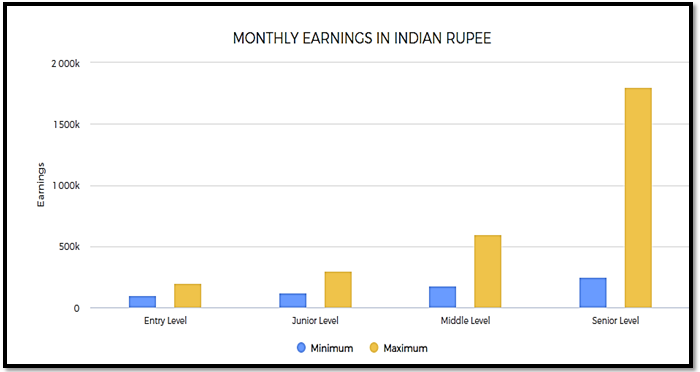
Monthly Earning In Indian Rupee
Entry Level | Junior Level | Mid-Level | Senior Level | |||||
Min Earning | Max Earning | Min Earning | Max Earning | Min Earning | Max Earning | Min Earning | Max Earning | |
100000 | 200000 | 120000 | 300000 | 180000 | 600000 | 250000 | 1800000 | |
1. Entry level: 0 - 2 years of work experience
2. Junior Level: From 1 to 12 years of work experience
3. Mid-Level: From 5 to 20+ years of work experience
4. Senior Level: From 10 to 25+ years of work experience (there could be exceptions in some high-end technical, financial, engineering, creative, management, sports, and other careers; also in the near future, people will reach these levels much faster in many careers and in some careers, these levels will have no meaning as those careers will be completely tech skill driven such as even now, there is almost no level in a Cyber Security Expert’s job)
Work Activities
1. Analyzing and interpreting data and information - Analysis of data and information to find facts, trends, reasons behind situations, etc.; interpretation of data to aid in decision making.
2. Assisting and caring for people - Assisting people in availing of services; taking care of people in different situations; offering help and services to others.
3. Communicating with co-workers and others - Communicating with people in writing, verbally or otherwise inside your workplace and various other people who have professional relationships with your place of work including vendors, government officials, etc. or with people at large
4. Developing and maintaining inter-personal relationships - Developing professional relationships with co-workers and others outside organisations and maintaining good relationships.
5. Getting Information and learning - Observing, hearing, reading, using computers, or otherwise obtaining information and learning from it.
6. Inspecting situations, events, and people - Inspecting situations, events and people to understand the reasons and causes for the situation or events to happen; inspecting people to understand reasons behind their behaviour and actions
7. Making decisions and solving problems - Analysis of data and information; evaluation of alternative decisions and results of decisions; taking the right decisions and solving problems.
8. Processing information - Compiling, tabulating, calculating, auditing, verifying or otherwise dealing with information processing including data entry, transcription, recording, storing and maintaining databases
9. Providing advice and consultation to others - Giving advice or consultation to others about various issues, conceptual matters, know-how, scientific matters, products or services
9. Strategic planning - Developing visions and goals, developing strategies and action plans for achieving visions and goals.
11. Updating and using relevant knowledge - Keeping updated with the latest knowledge relevant to your fields of work and use of the relevant knowledge in getting things done.
12. Using computers for work - Using computers for day-to-day office work; using computer software for various applications in day-to-day professional work; entering data and processing information; for writing.
13. Working directly with people - Working directly with people to offer them products and services, assisting, etc.
Future Prospects
1. The future of this pathway seems bright as the industry statistics are encouraging. The Healthcare Market in India has the potential to increase 3 fold to 133.44 billion US Dollars. Indian Government is willing to expand public health spending to 2.5% of GDP by 2025. Pradhan Mantri Jan Arogya Yojana (PMJAY) launched in 2018 provides 7,124.54 US Dollars each to over 100 million families every year.
2. The Healthcare Industry in India is one of the fastest-growing sectors and it is expected to reach $280 billion. The major focus is on quality of service and hence skilled labor is much required to sustain the growth of this industry.
3. By 2025, medical spending in India is expected to grow by almost 9 to 12% making India one of the world’s top ten in this zone. India’s earnings from medical tourism could exceed US$ 9 billion.
Future Prospects At A Glance
Current (0-1 year) | Long Term (2-5 year) | Very Long Term (6-10 years) |
Very High Growth | Very High Growth | Very High Growth |

